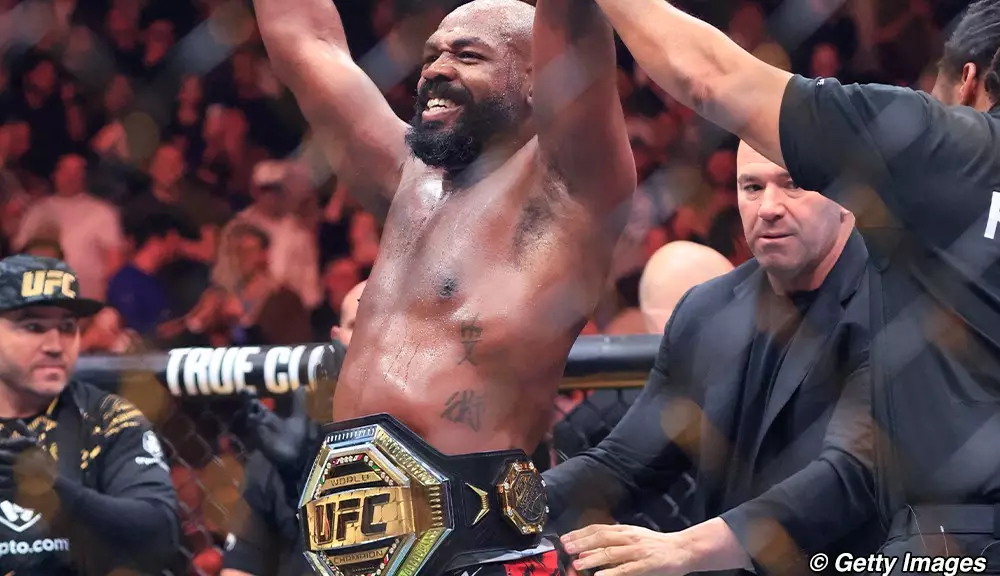Jon Jones has undoubtedly left an indelible mark on the world of mixed martial arts (MMA). What was once a fierce rivalry between him and fellow UFC star Daniel Cormier has faded into the background, yielding to a respect that reveals the complexities of competition and human achievement. This transition from animosity to admiration invites a deeper analysis of Jones’ unprecedented success and the implications of his longevity in the sport.
The historical rivalry between Jones and Cormier has captured the imaginations of MMA fans globally. Their contests, notably at UFC 182 and UFC 214, were characterized by drama, tension, and a palpable animosity that spilled over into the pre-fight buildup. This animosity was not merely a narrative device; it underscored the commitment and passion they both had for their craft. However, as Cormier transitioned from active competition to an esteemed position within the UFC Hall of Fame, his perspective has shifted. Cormier’s recent reflections reveal that he now recognizes how their fierce competition catalyzed growth for both athletes.
Despite their tumultuous past, Cormier has acknowledged Jones’ remarkable achievements. The very fact that Jones has maintained his status as a champion across divisions emphasizes his unparalleled dedication and skill. Cormier’s admission reflects a broader understanding that competition is not simply about rivalry but also about mutual elevation within the sport.
Cormier’s conversation with Ryan Clark sheds light on the extraordinary nature of Jones’ longevity. First claiming the light heavyweight title in 2011, Jones has survived through an evolution of fighting styles, competitors, and even generational shifts in the sport. Cormier likens this to Tom Brady’s tenure in professional football, noting the difficulties inherent in maintaining elite performance over such a protracted period.
The high-stakes world of MMA is continuously evolving, with new fighters emerging who often come with unyielding ambition and hunger for success. The physical strain, mental fortitude, and emotional resilience required to remain at the top in this environment are enormous. Both Cormier and Clark emphasize that while individuals like Kamaru Usman and Alexander Volkanovski may dominate in their time, the ability to maintain a long-standing championship reign is almost an impossible feat.
A fascinating aspect of Cormier’s remarks is the psychological toll that comes with the territory of being a champion. While enjoying the spoils of victory, champions find themselves constantly pursued by rising challengers motivated by a desire to dethrone them. This incessant pressure can lead to complacency, but for Jones, it has seemingly spurred him on to extraordinary heights.
Cormier highlights this dynamic, referencing young fighters who relentlessly strive for what champions possess—a stark reminder that success is often fleeting. The notion that a champion enjoys a comfortable lifestyle while younger competitors train intensely to seize that title adds layers of complexity to the narrative of longevity in the sport. It speaks volumes about the mental aspects of fighting—a realm where determination and perseverance can make all the difference.
As we approach 2025, the narrative surrounding Jon Jones has taken on a new form. While the past conflicts with Cormier may have defined their interactions, what remains is a prevailing sense of respect for Jones’ achievements. Cormier’s newfound appreciation serves as a testament to how the passage of time can transform animosity into recognition.
In a sport punctuated by rivalries, respect doesn’t come easily, nor does it come quickly. Yet in recognizing Jones’ unparalleled achievements, Cormier demonstrates the capacity for growth and understanding within the world of MMA. The transition from rivalry to commendation illustrates a fuller story: one of competition that not only shapes fighters but also fosters mutual admiration over time.
Jon Jones stands as one of the most complex figures in MMA history. As he continues to carve out his legacy, it is crucial to examine the intricacies of competition, the toll of longevity, and the evolution of respect that transcends personal rivalries. Every fight, every title defense, and every challenge faced contribute to a narrative that doubles as both a personal journey and a representation of the sport’s ever-changing landscape.

